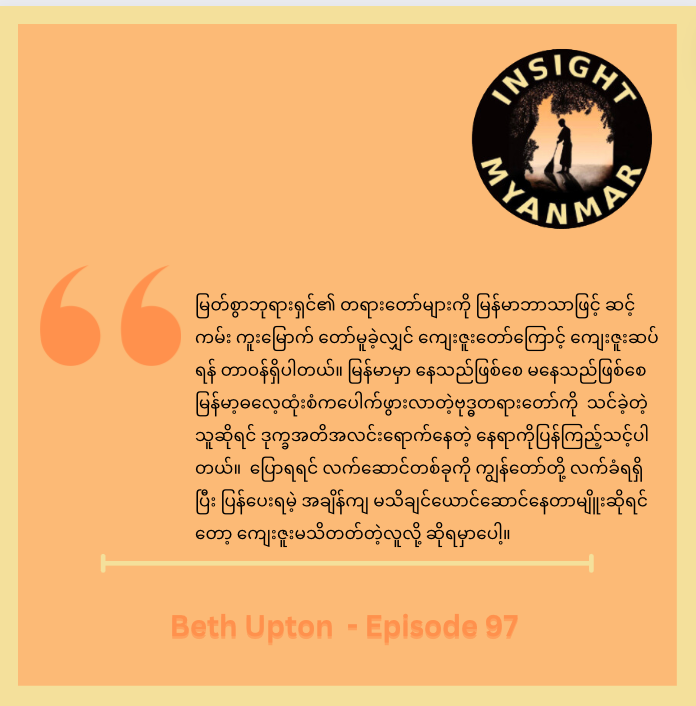Giving Back
“If we don't reciprocate, then we lose something in ourselves. We lose some authenticity or alignment in ourselves, on some level, and we know something is out of balance there. Whether you've directly spent time in Myanmar or not, if you are a dedicated practitioner of the Dhamma, then part of that has come from the Burmese tradition, and the dedication of the Burmese practitioners over hundreds of years. So when we receive that gift, and we don't repay it when reciprocity is needed, we are not fully congruent in ourselves.”
— Beth Upton, Episode #218
After studying economics and working in London’s financial center, Beth Upton grew disenchanted with rampant materialism, and, seeking a deeper meaning in life, she took robes and practiced meditation under Pa Auk Sayadaw. Now a lay meditation teacher, she offers courses around the world; her teaching style is uniquely personalized and insightful, and her courses are in growing demand.
Throughout her journey as a practitioner and teacher, Beth has always deeply valued the depth of Buddhist teachings found in Burma, recognizing them as a wellspring that continues to guide her. She highlights Burma's unique role in preserving and enriching the practice, noting that many influential Western meditation teachers have drawn heavily from Burmese traditions, or had an extended time of practice in the country. In a recent podcast conversation, she stressed the importance of acknowledging and protecting this rich heritage, fearing that another of the dark consequences of the military coup will be the loss of a more nuanced and refined understanding of the teachings, which is hard to find outside Burma.
Beth’s perspective is that practicing the Dhamma is not just something done for personal gain or development, but part of a broader, interconnected cultural and spiritual ecosystem that requires gratitude and support to be sustained and ultimately flourish. Her introductory quote emphasizes the moral and spiritual value of reciprocity in the context of the Dhamma's transmission. She suggests that avoiding the chance to give back for the spiritual gifts received can create an internal dissonance that leads to a loss of authenticity and alignment within oneself. As to what precise form this reciprocity should take, Beth feels this is up to the individual practitioner. Her overall message is that yogis who have benefited from a direct or even indirect connection to the spiritual heritage of Burma should make some effort to understand what the range of present needs are in that suffering country, and how one can help meet them.

